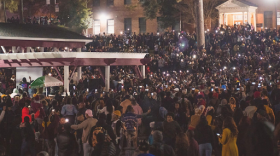2020 was a banner year for fundraising at Historically Black Colleges and Universities as HBCUs received a number of high-profile corporate and private gifts.
At the top of the list: philanthropist Mackenzie Scott, who gave more than $4 billion to organizations and HBCUs.
"I was exhilarated,” said William Harvey, president of Hampton University, when he heard the news that Scott had given his school an unrestricted $30 million donation last July. “Here is a billionaire that has compassion for others. I appreciate it very much, not only what she was doing for us, but what she was doing for others, as well."
HBCU administrators around the country welcomed the gifts, but many say there’s still more that needs to be done to correct decades of unequal treatment.
Since their inception, private and public HBCUs have always had to do more with less. They’ve consistently received less state and federal funds; they’ve always served more first-generation and low-wealth students; and their alumni donations, endowments, and federal research grants trail far behind historically white institutions.
"I think in many ways, we have been unknown,” said Reynold Verret Ph.D., the president of Xavier University of Louisiana. “If you go back into the archives of NPR or major newspapers, and look at the writing and the work reflecting on HBCUs 10 years ago, there was a certain pessimism around these schools. I think it was part of that 'American mindset'."
Verret added that Scott's $20 million gift will be used to fund more need-based scholarships for their students.
"We have this gap,” he said, between what is needed and what his school can provide to students. “This will not be enough."
Scott’s gifts to North Carolina HBCUs were sizable, as well: Winston-Salem State University got $30 million; North Carolina A&T State University received $45 million; and $15 million went to Elizabeth City State University.
"This gift will immediately change lives," said WSSU Chancellor Elwood L. Robinson, in a statement.
To get a sense of how transformative a gift like this can be, consider that ECSU's entire endowment, before Scott's gift, was $11 million. Her gift more than doubled it.
Endowments are the financial key for almost all colleges and universities. They are built up sometimes over hundreds of years, and the dividends that spin off the investments fund scholarships and faculty positions, among other key aspects of an institution.
HBCU endowments have always trailed those of historically white institutions.
Howard University, for instance, has the largest endowment of any HBCU in the country.
"We have a $750 million endowment,” said David Bennett, Vice President for Development and Alumni Relations at Howard. “That may sound like a lot of money, but I compare that to a University of North Carolina at Chapel Hill, with a $5 billion endowment. That is tens of millions of dollars a year that we can invest in growing."
Donors like Scott and others were very likely influenced by the COVID-19 pandemic's impacts on the Black community and the police killing of George Floyd when making their gifts. Now, HBCU administrators wonder if this increase in donations and visibility will last. State funding for HBCUS has not seen a corresponding jump.
"There'll be like something hot that people are going to give, and then they move on and it's similar to just how life is, especially in the U.S.,” said Marybeth Gasman, a professor at Rutgers University and the director of the Center for Minority Serving Institutions. “I'm hoping that people will take notice, and I'm hoping that HBCUs will communicate how they are stewarding the money so that everyone knows what a great job and the difference that they're making in people's lives."
Some of that messaging may already be making a difference. Howard University's alumni giving increased 80% last year.
"I think some of this may be one time, but I do believe a lot of it is going to be systemic change,” Bennett said. “Many of the people who have been giving to us have been long-term investors in social justice, in diversifying the healthcare pipeline, addressing social disparities and health. They just have been doing it at traditional white institutions."









